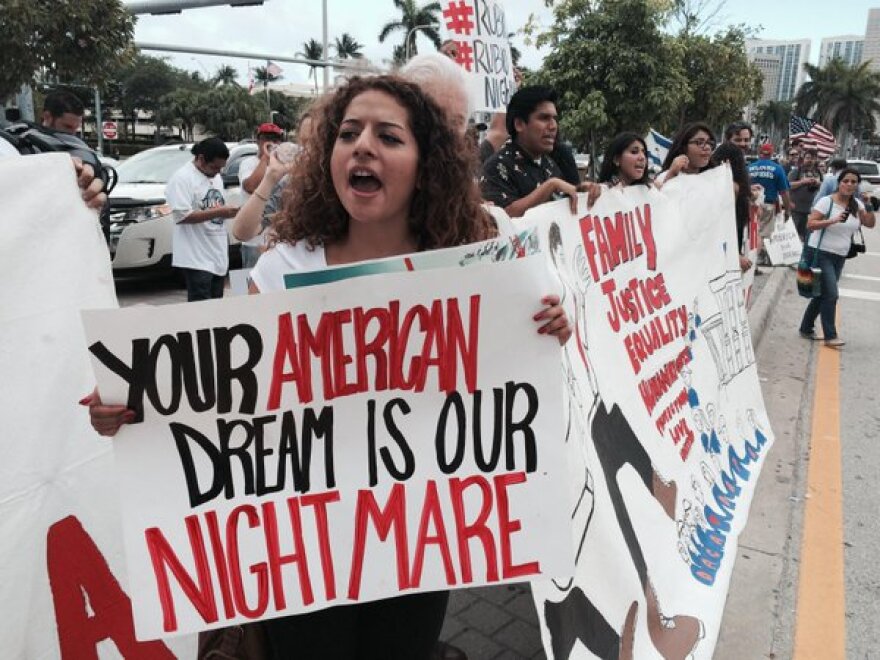Cuban culture has dominated Miami for decades. Cuban-Americans are the area’s largest Latino group and have loads of political representation.
But the number -- and influence -- of immigrants from other Latin American countries is growing. And there’s a tense debate over the immigration privileges Cubans enjoy -- because no other immigrant group gets them.
Take Miami's Little Havana. It used to be all Cuban. Today it’s brimming with fritangas, or Central American restaurants like the one Magda Molina manages. She’s from Colombia, and this is where her employees are from:
"They're Nicaraguan, Salvadoran, Cuban, Honduran -- they're from everywhere," she says.
RELATED: Florida Roundup: Cuban Adjustment Act
That reflects the change in South Florida and especially Little Havana. But so did protesters at Florida Sen. Marco Rubio’s presidential campaign announcement at the Freedom Tower in downtown Miami in April.
Rubio is Cuban-American, and the Freedom Tower is where Cuban refugees came to get asylum in the 1960s. Many non-Cuban Latinos who came to his announcement event felt Rubio should be doing more for immigration reform.
And that includes a reconsideration of the U.S.'s “wet foot/dry foot” policy. That’s slang for the Cuban Adjustment Act. Under the law, Cubans who make it to U.S. landbecome permanent residents just one year later.
"The Cubans are treated as refugees, but they don't have to prove persecution." -Megan O'Matz
No other immigrant group in the country gets that fast track.
The law was enacted in 1966 as a reaction to Fidel Castro’s communist revolution. But now that the U.S. and Cuba have re-established diplomatic relations a lot of people are questioning whether the policy should still exist.
That's especially true after a recent investigation by the South Florida Sun Sentinel found Cuban migrants are getting welfare benefits in the U.S. -- and then returning to Cuba.
"The Cubans are treated as refugees, but they don't have to prove persecution," says Megan O’Matz, one of the reporters on the Sun Sentinel story. "And now many are coming and getting the aid without having to prove that they were suffering in Cuba."
A bill to repeal the Cuban Adjustment Act was recently introduced in Congress. And even Cuban-American members of Congress like Miami’s Carlos Curbelo say the law should be reformed.
But unless that happens, many non-Cuban immigrants will remain angry about the policy. They don’t feel Cubans deserve such an easy path to America.
Consider some of the recent comments from El Nuevo Herald’s Facebook page:
"Deport [Cuban migrants] once and for all; they need to have visas now like everyone else."
"If there's an embassy now, why do they come on rafts?"
CAN'T GO HOME
"They should be very resentful," says Cuban-American talk show host Maria Elvira Salazar of Mira TV, a Spanish-language network based in Hialeah. But she adds:
"What they may not understand is that the Cubans were able to acquire that immigration status because they don't have a fatherland. It's the only country in Latin America where you cannot go home for Christmas or New Year's Eve."
But other Latin American immigrants say they can’t go home either.
"When I got on the plane to Miami, it was like ripping off a piece of myself," says Henry Castillo, a Venezuelan journalist who moved to Miami with his wife and daughter a few months ago to seek political asylum. He claims Venezuela's authoritarian government threatened his life.
If Castillo does get asylum, he can't go back to Venezuela.
"The things Cubans suffered 50 years ago," he says, "we're suffering them now."
Salazar, the Mira TV host, understands Castillo’s point.
"The Venezuelans are the Cubans of the 2000s," she says. "Now the big question is, will the U.S. treat them the same as the Cubans? I don't think so. I think it was just in that lifetime what the Cubans received."
That reality is why some people say it’s time for the U.S. to repeal the Cuban Adjustment Act -- or extend it to other immigrants.




